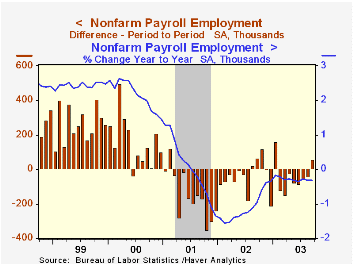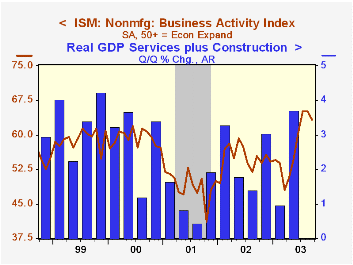 Global| Oct 03 2003
Global| Oct 03 2003U.S. Nonfarm Payrolls Rose
by:Tom Moeller
|in:Economy in Brief
Summary
Nonfarm payrolls rose unexpectedly by 57,000 (0.04%) in September. It was the first m/m gain in payrolls since January. The previously reported sharp drop in August payrolls was more than halved to 41,000 but July's decline was [...]

Nonfarm payrolls rose unexpectedly by 57,000 (0.04%) in September. It was the first m/m gain in payrolls since January. The previously reported sharp drop in August payrolls was more than halved to 41,000 but July's decline was deepened slightly. Consensus estimates had been for a 20,000 worker decline in September payrolls.
For 3Q03 the index of aggregate hours worked in private industries (employment times hours worked) fell at a 0.9% annual rate versus 2Q, about half that quarter's rate of decline. Hours worked were unchanged in September.
The one-month diffusion index for private nonfarm payrolls improved to 47.1 but a level below 50 bodes poorly for a meaningful pickup in hiring activity.
Declines in manufacturing sector payrolls continued. They have fallen in every month since July 2000 and are down 2.762 million (15.9%) during that period. The one-month diffusion index for factory payrolls rose to a still quite low 28.6.
Service producing jobs rose 74,000 (0.1% y/y). The gains were fairly broad based amongst industries though professional & business services jobs rose a hefty 66,000 (0.4%). Half of that gain was in the temporary help services category. Government sector jobs fell 15,000 (-0.4% y/y).
From the separate household survey, the unemployment rate was stable at 6.1% versus expectations for 6.2%. Employment fell 52,000 (0.2% y/y) following a 147,000 August gain. The labor force rose 15,000 (0.6% y/y).
Average hourly earnings fell an unexpected 0.1%. The decline was due to earnings drops in several private service industries.
| Employment | Sept | Aug | Y/Y | 2002 | 2001 | 2000 |
|---|---|---|---|---|---|---|
| Payroll Employment | 57,000 | -41,000 | -0.3% | -1.1% | 0.0% | 2.2% |
| Manufacturing | -29,000 | -46,000 | -4.2% | -6.9% | -4.8% | -0.3% |
| Average Weekly Hours | 33.7 | 33.7 | 33.9 | 33.9 | 34.0 | 34.3 |
| Average Hourly Earnings | -0.1% | 0.2% | 2.7% | 2.9% | 3.8% | 3.9% |
| Unemployment Rate | 6.1% | 6.1% | 5.7% | 5.8% | 4.8% | 4.0% |
by Tom Moeller October 3, 2003

The Institute for Supply Management reported that in September, the index of activity in the nonmanufacturing sector was down slightly from the record August to 63.3. Consensus expectations were for a decline to 63.0.
The seasonally adjusted orders index fell sharply to 59.9 from the August record high of 67.6.
The employment index fell to 49.1 from 51.0 in August. Since the series' inception there has been an 85% correlation between the level of the ISM nonmanufacturing employment index and the y/y change in payroll employment in the service producing and construction industries.Business activity for the nonmanufacturing sector is a question separate from the subgroups mentioned above. In contrast, the NAPM manufacturing sector composite index weights the components.
The seasonally adjusted prices index rose sharply for the second month in a row to 60.1.
ISM surveys more than 370 purchasing managers in more than 62 industries including construction, law firms, hospitals, government and retailers. The nonmanufacturing survey dates only to July 1997, therefore its seasonal adjustment should be viewed tentatively.
| ISM Nonmanufacturing Survey | Sept | Aug | Y/Y | 2002 | 2001 | 2000 |
|---|---|---|---|---|---|---|
| Business Activity Index | 63.3 | 65.1 | 55.4 | 55.1 | 49.0 | 59.3 |
| Prices Index | 60.1 | 55.7 | 54.2 | 53.9 | 51.6 | 63.5 |
Tom Moeller
AuthorMore in Author Profile »Prior to joining Haver Analytics in 2000, Mr. Moeller worked as the Economist at Chancellor Capital Management from 1985 to 1999. There, he developed comprehensive economic forecasts and interpreted economic data for equity and fixed income portfolio managers. Also at Chancellor, Mr. Moeller worked as an equity analyst and was responsible for researching and rating companies in the economically sensitive automobile and housing industries for investment in Chancellor’s equity portfolio. Prior to joining Chancellor, Mr. Moeller was an Economist at Citibank from 1979 to 1984. He also analyzed pricing behavior in the metals industry for the Council on Wage and Price Stability in Washington, D.C. In 1999, Mr. Moeller received the award for most accurate forecast from the Forecasters' Club of New York. From 1990 to 1992 he was President of the New York Association for Business Economists. Mr. Moeller earned an M.B.A. in Finance from Fordham University, where he graduated in 1987. He holds a Bachelor of Arts in Economics from George Washington University.






